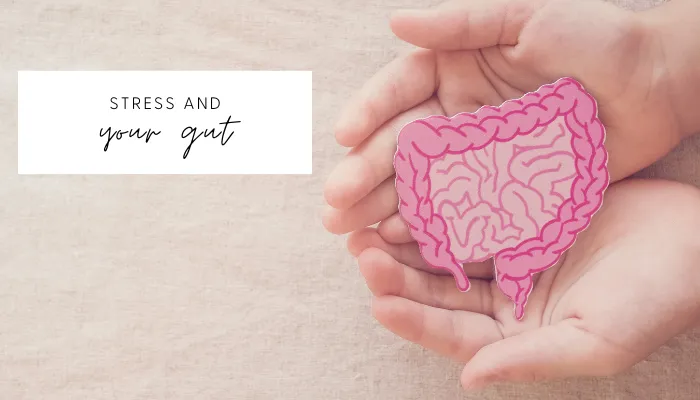On The Blog

Stress And Your Gut.
Have you ever noticed when you feel stressed your gut starts reacting? Have you ever wondered what the connection is?
Everyone feels stress differently and their stress is triggered by a variety of factors. It could be your health, finances, the loss of someone special, deadlines, the kids, a relationship, war, a pandemic...the list could go on. No matter the why, today's societal expectations and your busy life can be full of stress. How that impacts your gut is what I want to focus on here.
Changes to the system
When you are faced with a stressful situation your sympathetic nervous system kicks into gear the 'fight or flight' response. I know many of you would have heard about this fight or flight response - just about everyone is talking about it lately in relation to health. Why? Because stress is so prevalent in our lives currently, and our body's natural response to it is overworked and overwhelmed, resulting in many changes to our health.
But, I skip ahead.
When the flight or fight response is activated (I comically picture the brain pushing a big red emergency button), then a flood of stress hormones are released, the main ones being cortisol and adrenaline. These hormones go straight to work preparing the body to run or stand and fight. They are responsible for increasing your heart rate and blood pressure, you'll also see a rise in your blood glucose levels (quick energy) and breathing.
As part of this fight or flight process, your digestive system becomes less important. I mean, who wants to have a quick bite to eat with perceived doom approaching. Your regular digestion then changes or decreases, possibly even stopping its regular processes. For some, it will result in an urgent emptying of the bowels.
More changes
Even when we aren't dealing with a significantly stressful event, general stress can effect the other functions of the gut. Stress increases the gut and intestines permeability. This reduces the guts ability to absorb vital nutrients, minerals, and fluids and other nasties like toxins and harmful bacteria can cross over instead.
Increased permeability sparks the immune system into an inflammatory response, which triggers the release of more stress hormones. Studies have also shown that an increase in the stress related hormone cortisol has shown a corresponding change to the diversity of bacterias in the gut.
Impacting your microbiome
To recap, the gut microbiome is a community of microorganisms that are located throughout your gastrointestinal tract, with the majority found in the intestines. The microbiome is made up of diverse bacteria, archaea, protozoa, eukaryotes, and viruses. These microscopic little guys are essential to you digesting food, regulating your immune health, essential vitamin production, protection against diseases, and more.
People studied with stress-associated conditions, such as anxiety or depression, were found to have altered microbiomes. Unlike a healthy persons, these stressed biomes had larger numbers of bacterial species that are connected to poor health.
The microorganisms are often termed 'good bacteria' and 'bad bacteria'. This is technically incorrect. We need a healthy balance of all of the bacterial species, some less than others. It's when stress impacts this balance we can also see impact on our health and moods.
Our second brain
The gut has been coined the bodies second brain. It's able to communicate with our brain via neural, immune, and hormonal pathways. The main route is via the vagus nerve (neural). This nerve is the brains connection to your digestive system and organs, with signals going back and forth between the two.
Seratonin, a neurotransmitter linked to mood and stress-associated disorders, can activate and send signals via the vagus nerve, plus other important functions. Your gut produces the majority of your serotonin. If your guts microbiome is off balance due to stress, then your mood and response to further stress can be impacted.
What we eat significantly influence our gut microbiome. Stress that we feel or experience can also significantly impact our gut. So, what can you do to aid your gut through periods of stress?
Strategies to support your gut:
Eat plenty of plant-based prebiotic foods, such as wholegrain's, vegetables, nuts, seeds, and legumes.
Eat variety. The easiest way to get a healthy diverse microbiome is to eat a diverse variety of plant foods. Each colour and variety offers various essential nutrients, minerals, and beneficial fibre.
Try the Mediterranean diet - it's a great example of a plant rich diet alongside healthy good fats and proteins.
Exercise - it increases serotonin levels, gut microbiome diversity, and beneficial gut bacteria. It doesn't have to be a hard core gym session. Exercise might be a walk with the dog, swimming, pilates, yoga, or a dance class. Whatever you enjoy.
Find a hobby that bring you some joy! Extra points if you can shut off the hectic world around you at the same time. Things like meditating, gardening, reading, painting, or even drinking a cup of tea in the fine china.
Find a practitioner. If your stress and gut related issues feel out of your control or you need more help, find a practitioner that can support you with more individualised assistance.
© Copyright 2022 Evolved Nutrition

